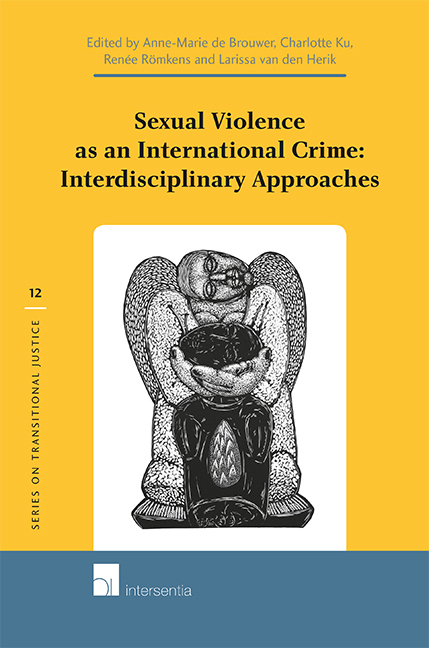Book contents
- Frontmatter
- Acknowledgements
- Foreword
- Contents
- Abbreviations
- INTRODUCTION
- PART 1 OVERVIEW OF SEVERAL MILESTONES AND CHALLENGES CONCERNING INTERNATIONAL CRIMINAL PROSECUTION OF SEXUAL VIOLENCE
- A HISTORICAL PERSPECTIVE, THE WAY FORWARD AND MILESTONES LONG OVERLOOKED
- THE INTERNATIONAL TRIBUNALS AND COURTS
- PART 2 SOCIAL, ARCHIVAL AND MEDICAL DATA COLLECTION AND ITS USE FOR THE CRIMINAL LAW PROCESS: METHODOLOGY ISSUES
- PART 3 SURVIVING SEXUAL VIOLENCE, STORY TELLING AND CREATING AWARENESS
- CONCLUDING REMARKS
- About the Contributors
Chapter 17 - How to Move Forward? Interdisciplinary Approaches to Recognizing, Investigating and Prosecuting Sexual Violence as an International Crime
Published online by Cambridge University Press: 16 December 2020
- Frontmatter
- Acknowledgements
- Foreword
- Contents
- Abbreviations
- INTRODUCTION
- PART 1 OVERVIEW OF SEVERAL MILESTONES AND CHALLENGES CONCERNING INTERNATIONAL CRIMINAL PROSECUTION OF SEXUAL VIOLENCE
- A HISTORICAL PERSPECTIVE, THE WAY FORWARD AND MILESTONES LONG OVERLOOKED
- THE INTERNATIONAL TRIBUNALS AND COURTS
- PART 2 SOCIAL, ARCHIVAL AND MEDICAL DATA COLLECTION AND ITS USE FOR THE CRIMINAL LAW PROCESS: METHODOLOGY ISSUES
- PART 3 SURVIVING SEXUAL VIOLENCE, STORY TELLING AND CREATING AWARENESS
- CONCLUDING REMARKS
- About the Contributors
Summary
Although the explicit criminalization and efforts to prosecute sexual violence as an international crime are relatively new when compared to the long historic presence of these crimes in times of conflict, the international judicial response to such crimes is already breaking new ground in attending to the needs of individual survivors even while trying to establish a trail of mass brutality. The stories represented in this volume are very human whether of the survivors of these crimes or of those advocates dedicated to the prosecution of such violations or of the countless others who become involved as field workers or judicial officials. What this volume highlights is, amongst other things, that the issue of sexual violence is not an academic or theoretical subject far removed from people, but is very much an issue of individuals and communities caught up in waves of violence. An issue that concerns and affects us all, and that therefore needs to be recognized and addressed on multiple levels in order to be prevented and prosecuted. It further underscores the need to involve survivors and others in the peace-building process following a conflict beyond judicial process and the punishment of the perpetrators of these acts.
The juxtaposition of single acts of extreme violence against a backdrop of mass brutality of course is one of the reasons why these crimes have been difficult to address. For one thing, a conflict environment is not congenial to the systematic gathering of evidence and the carrying out of orderly judicial and legal process. Yet, strides have been made to prosecute those responsible for war crimes, crimes against humanity and genocide, but less so when the focus has been on sexual and gender based crimes.
- Type
- Chapter
- Information
- Publisher: IntersentiaPrint publication year: 2013

